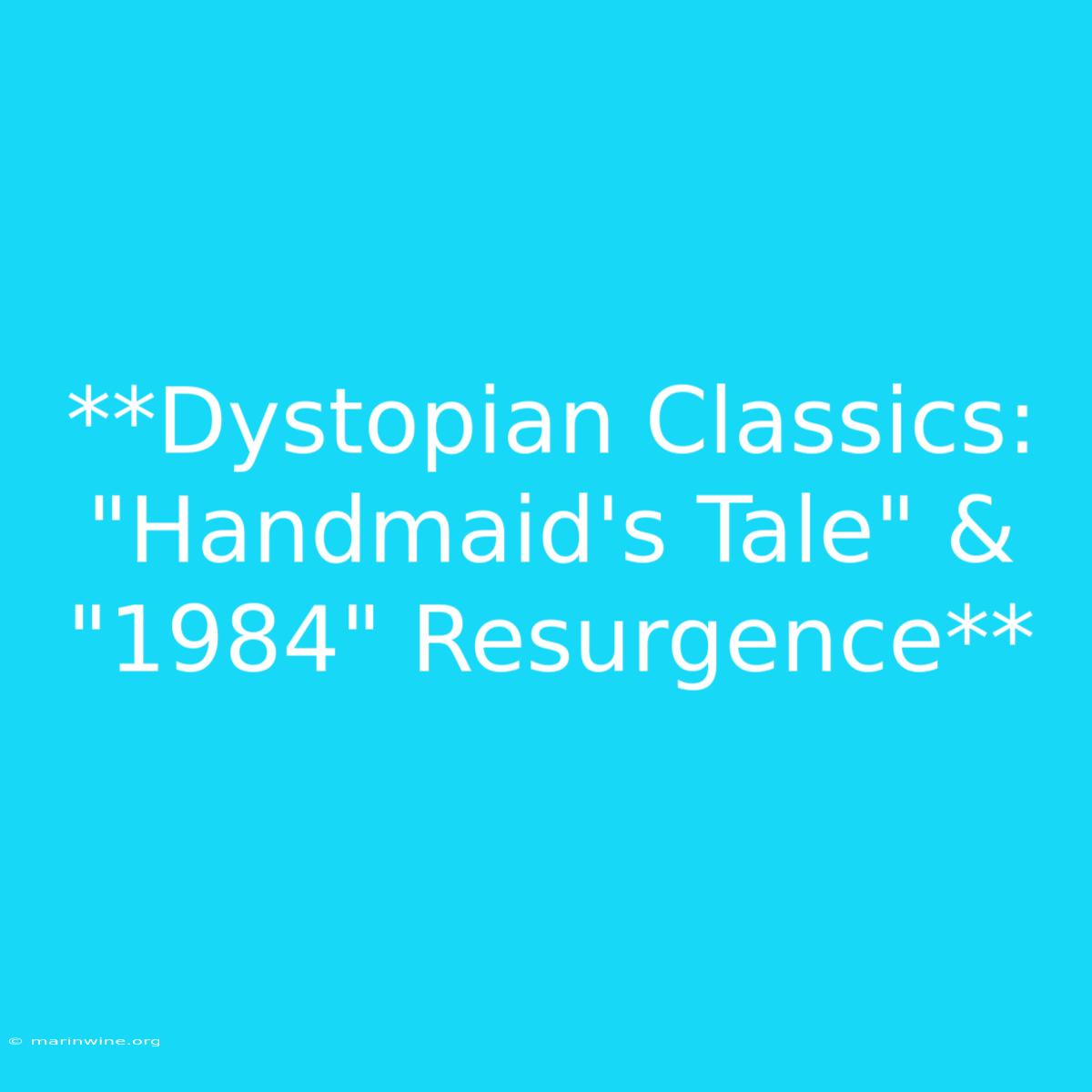Dystopian Classics: "Handmaid's Tale" & "1984" Resurgence
Have you noticed a resurgence of interest in dystopian classics like "The Handmaid's Tale" and "1984"? This isn't just a coincidence. These novels, once relegated to the shelves of literary enthusiasts, are now back in the spotlight, reflecting anxieties about the modern world.
Why It Matters
The renewed interest in dystopian literature speaks volumes about our current political and social climate. These books, originally written in the 20th century, are resonating with readers today because they offer chillingly relevant narratives about totalitarian regimes, surveillance, and the erosion of personal freedoms.
This article explores the key themes and factors contributing to this resurgence, examining how these classics remain relevant in the 21st century.
Key Takeaways
| Key Takeaway | Description |
|---|---|
| Echoes of Reality: Dystopian themes resonate with contemporary concerns. | The novels' depiction of surveillance, authoritarianism, and social control mirror anxieties in the digital age. |
| Cultural Impact: These books have sparked conversations about social justice. | They offer a platform for discussing issues like gender inequality, censorship, and political corruption. |
| Enduring Relevance: Dystopian classics serve as warnings and catalysts for change. | Their timeless themes encourage readers to engage in critical thinking about social issues and the potential for societal regression. |
Dystopian Classics: A Resurgence in the 21st Century
The Handmaid's Tale
Margaret Atwood's "The Handmaid's Tale" is a powerful exploration of gender oppression and totalitarian control. Set in the Republic of Gilead, a dystopian America where women are stripped of their rights and forced into servitude, the novel paints a chilling picture of a future where religious fundamentalism has taken over.
Key Aspects:
- The Role of Women: The novel delves into the oppressive societal structure that relegates women to reproductive roles.
- Social Control: The totalitarian regime of Gilead uses fear, surveillance, and violence to maintain its grip on power.
- Resistance: The novel portrays the struggle for freedom and the power of individual defiance against oppression.
Connecting "The Handmaid's Tale" to Current Events:
The novel's exploration of reproductive rights, gender inequality, and the rise of religious extremism resonates with contemporary debates about women's health, LGBTQ+ rights, and the increasing influence of political ideologies.
1984
George Orwell's "1984" is a haunting depiction of a totalitarian state where Big Brother watches everyone, thought is controlled, and truth is manipulated. The novel follows Winston Smith, a man who rebels against the oppressive regime, only to find himself ensnared in a web of surveillance and propaganda.
Key Aspects:
- Surveillance State: "1984" explores the pervasive nature of surveillance technology and its impact on individual freedom.
- Propaganda and Censorship: The Party controls information and distorts history to maintain its hold on power.
- Loss of Individuality: The novel highlights the dangers of conformity and the erosion of personal identity under a totalitarian regime.
Connecting "1984" to Current Events:
The novel's themes of surveillance, information control, and propaganda are eerily relevant to the digital age, where social media platforms and online data collection are increasingly shaping our lives.
FAQ
Q: Are these novels simply alarmist or do they offer valuable insights?
A: These novels offer valuable insights into human nature and the potential for societal regression. They serve as warnings about the dangers of unchecked power and the importance of critical thinking.
Q: Are these novels only relevant for the past?
A: While set in different historical contexts, the themes of these novels are timeless. They address universal concerns about human rights, freedom, and the potential for oppression that can resonate across generations.
Q: How can these novels inspire positive change?
A: These novels encourage readers to question authority, fight for individual freedoms, and advocate for a more just and equitable society. They can inspire activism, social justice movements, and a greater awareness of the fragility of democracy.
Tips for Reading "The Handmaid's Tale" and "1984"
- Engage with the Themes: Reflect on the novel's key themes and their connection to current events.
- Discuss with Others: Engage in conversations about the books' social and political implications.
- Research the Historical Context: Explore the historical context of the novels and their influence on literature and culture.
- Consider the Future: Reflect on the potential dangers and possibilities that these books present for the future.
Summary: Dystopian Classics - A Mirror to Our Times
The resurgence of interest in "The Handmaid's Tale" and "1984" reflects a growing awareness of the dangers of authoritarianism, surveillance, and the erosion of personal freedoms. These novels, though written decades ago, offer chillingly relevant warnings about the potential for societal regression and the importance of fighting for individual rights and justice. By engaging with these classics, we can learn from the past and strive for a more equitable and democratic future.

